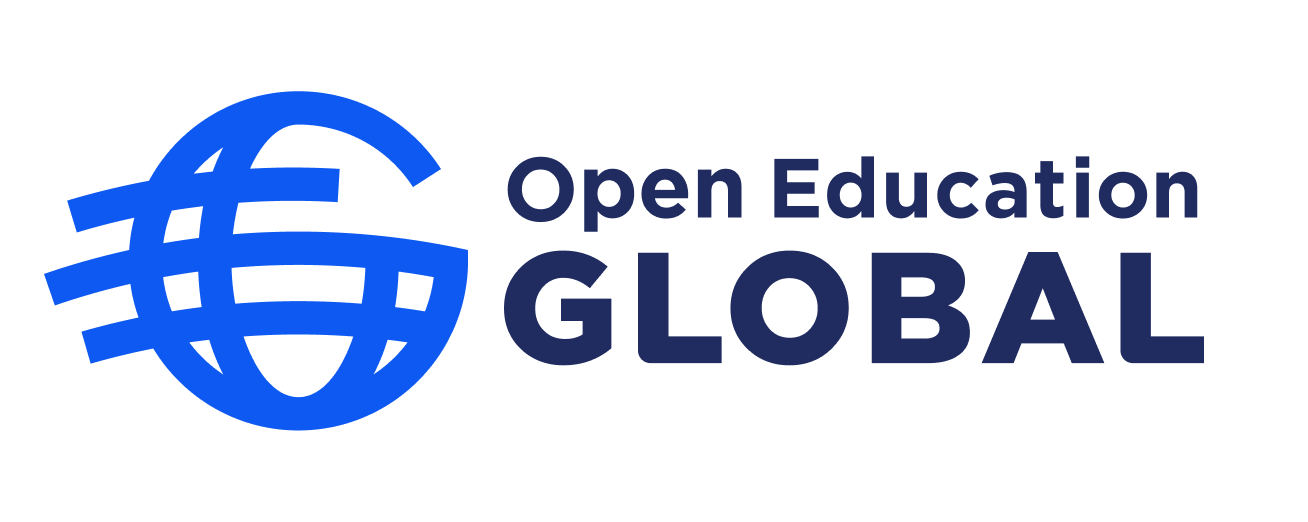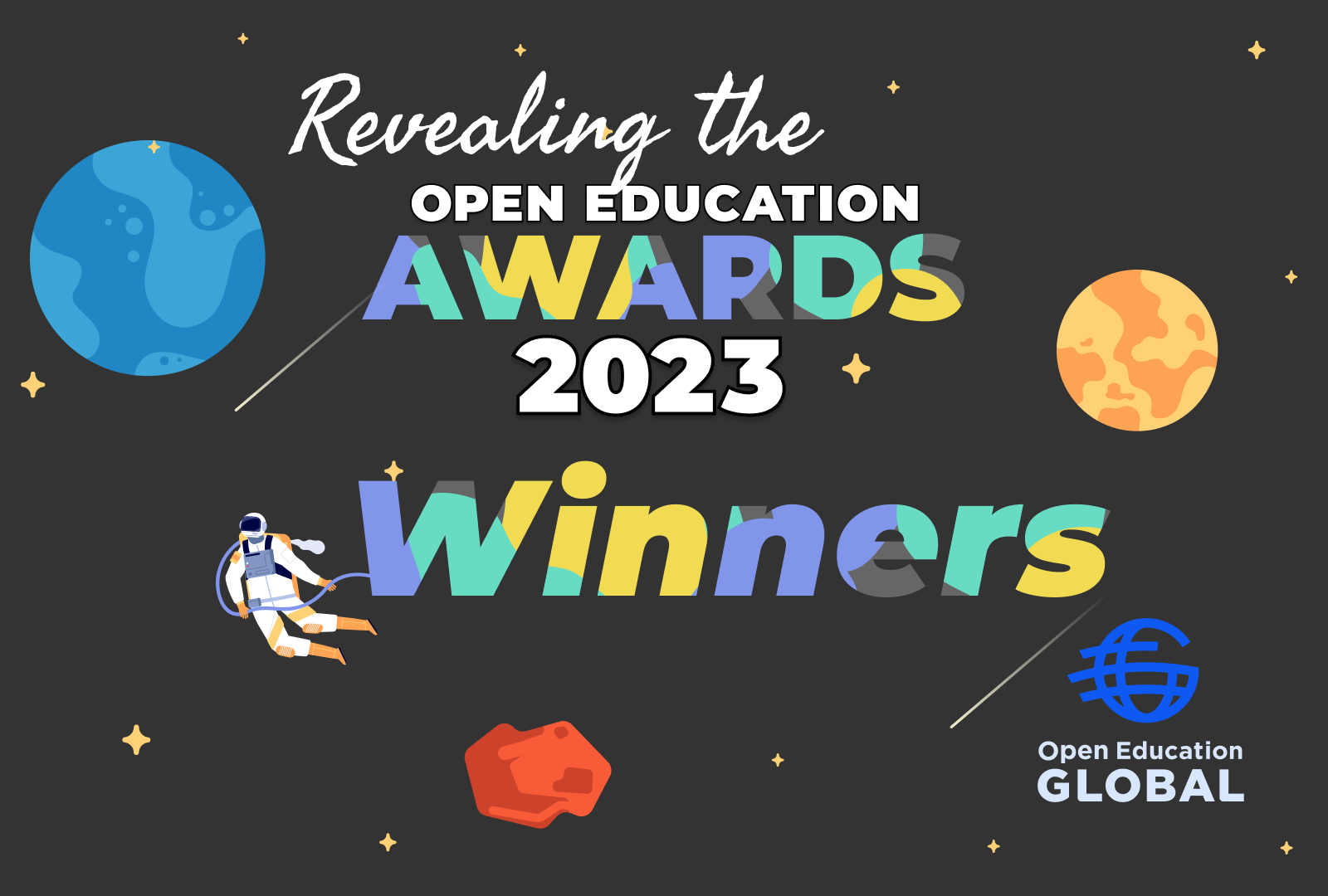On September 13, 2023, Open Education Global (OEGlobal) announced the winners of the 2023 Open Education Awards for Excellence as an OEG Live webcast. If you missed the excitement, you can watch it anytime:
This annual effort provides recognition to outstanding contributions in the Open Education community, recognizing exemplary leaders, distinctive Open Educational Resources, and Open Practices worldwide.
This year the program received and shared nominations for more than 170 people and projects received from 38 different countries. The 20 member committee consisting of previous award winners and the OEGlobal Board of Directors reviewed the nominations to yield the shortlist of finalists and this collection of 16 Award Winners for 2023.
With a visual theme of exploration, this year’s awards represents the essence of discovering open education in the world but also the key component of sharing those findings openly to inspire others. OEGlobal invites you to explore, congratulate, and share widely the 2023 Open Education Awards for Excellence winners.
Meet the 2023 Award for Excellence winners
People of Open: Individual Award Winners
Open Education is a human movement that is only possible due to the work and passion of extraordinary people. The 2023 Open Education Awards for Excellence recognizes these People of Open with Individual Awards:
- The Catalyst Award goes to Jennryn Wetzler at Creative Commons, USA
- The Leadership Award goes to Patrina Law at the Open University, United Kingdom
- The Open Educator Award goes to Maha Bali at The American University in Cairo, Egypt
- A shared Student Award goes to Matthew Barkovich, Henry Agnew, and Ethan Turner at LibreTexts
- Another Student Award goes to Yasser Tamer Atef at The American University in Cairo, Egypt
Meet the Individual Award Winners…
What We Share: Open Assets Award Winners
Open assets are what open education initiatives produce and use, tangible goods (usually digital) with educational purpose and value. Open assets are produced, curated, and distributed in ways that make them freely accessible, usable, and improvable by others. The 2023 Open Assets Awards Winners are:
- The Open Curation / Repository Award goes to Storyweaver where Pratham Books provides thousands of story books to address literacy needs where needed the most, in over 300 languages.
- The Open Infrastructure award goes to Openverse a search tool supported by the WordPress Foundation of over 700 million open licensed licensed images and audio from multiple sources.
- The Open Reuse / Remix / Adaption Award goes to the HUM 1: Modern Humanities on Manifold the open textbook on Modern art and culture published by Kingsborough Community College, USA
- The Significant Impact OER Award goes to the multifunctional resource addressing an often misunderstood social challenge- Understanding Homelessness in Canada: From the Street to the Classroom created by Trent University and experts with lived and field experience from the Canadian Observatory on Homelessness, Canada.
Meet the Open Assets Award Winners…
How We Share: Open Practices Award Winners
Open Practices are collective behaviors and techniques that open up access to educational opportunities. The 2023 Open Practices Award Winners are:
- The Open Collaboration Award goes to the The National Teaching Repository organized by a network of practitioners interested in promoting sharing and academic recognition, United Kingdom.
- The Open Pedagogy Award goes to Buds, Branches and Bark: A Guide to Winter Identification in the Pacific Northwest an open textbook developed by Julia Alards-Tomalin and over 200 students at British Columbia Institute of Technology Pennsylvania State University, Canada.
- The Open Policy Award goes to Washington OER and Low-Cost Labeling Policies spearheaded enacted by 34 members of the Washington Community and Technical College system, with significant leadership from the system’s student leadership organization, USA
- The Open Research Award goes to the Special Issue of the Journal for Multicultural Education edited by Stacy Katz and Jennifer Van Allen at Lehman College, USA.
Meet the Open Practices Award Winners…
Special Awards
While the core categories of OE Awards (individual, resources & practices) remain the same each year, we always look for ways to reflect new trends and emerging innovations recognized through awards that change with the times. The Award winners in this years Special category are:
- The Diversity, Equity & Inclusion Award goes to Enhancing Inclusion, Diversity, Equity and Accessibility (IDEA) in Open Educational Resources (OER) created by Nikki Andersen, Southern Queensland University, Australia to provide authors and librarians with practical strategies for producing diverse, inclusive and accessible OER and open textbooks.
- The Open Resilience Award goes to Responsive OER for Ukrainian developed by OpenLearn, United Kingdom to provide key resources and supports for Ukrainian refugees displaced by the Russian invasion.
- For a new category, the Wildcard Award goes to “We Like Sharing” Open Photo Competition TU Delft’s annual photography event that fosters an understanding of openness through a call for photos that represent the concept.
Meet the Special Awards Winners…
Learn about all of these award winners via the Meet the 2023 Winners pages or directly in the OE Awards Hall of Fame. And join us all in congratulating every person and project nominated or shortlisted in 2023- we and they are all the winners our shared efforts to expand the benefits of open education around the globe.
Congratulate and engage the winners in OEG Connect
What do you think of the winners? Add to the discussions below and share your experiences of these people and projects by clicking on reply in OEG Connect below.


Congratulate the Individual winners in OEG Connect
Explore the Open Assets winners in OEG Connect
See how Open Practices winners did it in OEG Connect
Review the Special Award winners in OEG Connect
We are looking forward to Monday’s Awards session at OEGlobal 2023, we have five awardees attending the conference who will share short presentations about their open education efforts- see session info at https://sched.co/1SIad
This happens at 2023-10-16T17:00:00Z→2023-10-16T18:00:00Z (converted to your local time)
But wait! We will have a live stream of the session available in the OEG Connect viewing room and an open live chat to share the experience with other viewers.